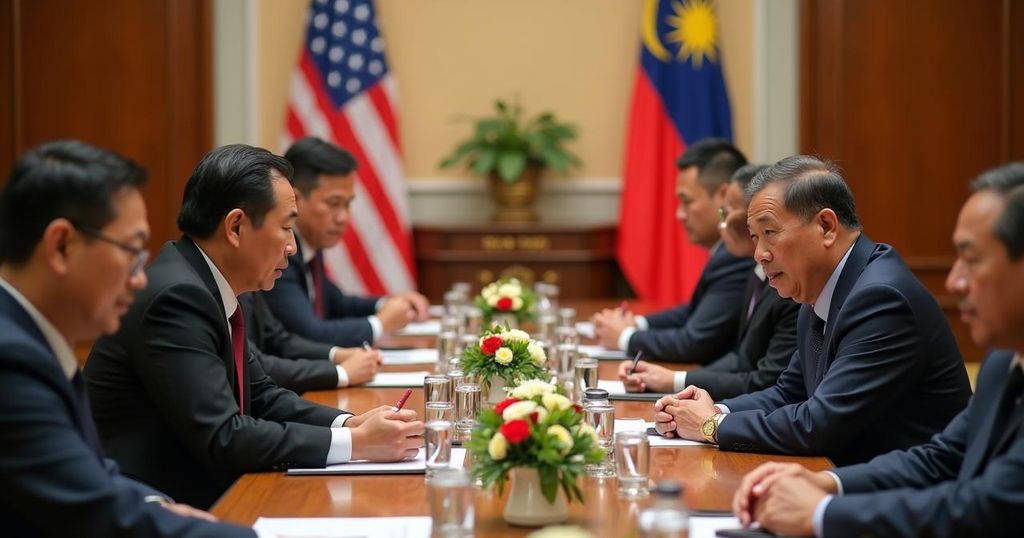ASEAN Leadership Transition: A Year of Laotian Stewardship and Malaysian Promises

Laotian Prime Minister Sonexay Siphandone transferred the ASEAN chairmanship to Malaysian Prime Minister Anwar Ibrahim after a summit in Vientiane, where Laos effectively demonstrated its influence despite its size. As Malaysia prepares to lead with the theme “Inclusivity and Sustainability,” critical issues like the Myanmar crisis, Timor-Leste’s accession, and South China Sea disputes are highlighted as urgent matters that require ASEAN’s concerted efforts under the new leadership.
On Friday, Laotian Prime Minister Sonexay Siphandone transferred the ASEAN chairmanship to Malaysian Prime Minister Anwar Ibrahim following the conclusion of the bloc’s leaders’ summit in Vientiane. Laos is to be commended for its effective leadership of ASEAN throughout the past year, demonstrating its economic and political influence despite its smaller size relative to regional giants like Indonesia. Prime Minister Siphandone successfully adhered to ASEAN principles, particularly in the context of Myanmar, where he navigated criticism regarding a perceived lenient stance toward the military junta, which remains excluded from official ASEAN forums due to its failure to comply with the bloc’s five-point consensus on restoring democracy and halting violence. During the recent East Asia Summit, crucial topics like the situation in the Korean Peninsula and concerns over Russia’s actions in Ukraine were addressed, showcasing regional cooperation. Leaders emphasized the necessity for self-restraint concerning the South China Sea disputes, urging all involved nations to avoid actions that may heighten tensions. As Malaysia prepares to assume the chairmanship with the theme of “Inclusivity and Sustainability,” expectations are high for Prime Minister Anwar, who possesses extensive knowledge of ASEAN dynamics. There is hope that he will not only resolve outstanding issues within ASEAN but also lay a stronger foundation for achieving the bloc’s vision for 2045. Indonesia, under the incoming leadership of Prabowo Subianto, is anticipated to adopt a more vigorous approach towards ASEAN compared to the previous administration of Joko Widodo, who is concluding his presidency while having missed significant opportunities, including the recent summit. Several pressing items urgently require ASEAN’s attention. The ongoing civil war in Myanmar stands at the forefront, with Thailand’s newly elected Prime Minister Paetongtarn Shinawatra proposing an informal meeting to facilitate dialogue. There is a consensus that ASEAN must be more flexible than strictly adhering to the five-point consensus, allowing for broader engagement, particularly from influential neighbors like China and India. Further, it is imperative to expedite the accession process for Timor-Leste into ASEAN. Both Prime Ministers Siphandone and Anwar have expressed a commitment to advancing Timor-Leste’s membership, especially following its representation in the recent summit. With international support available to meet ASEAN’s membership criteria, the delay in Timor-Leste’s accession should now be resolved. Lastly, Laos’s tenure did not seek to appease China concerning the South China Sea, as evident in the objective to expedite the negotiations for a non-binding Code of Conduct. The establishment of such a code is crucial for fostering trust and maintaining stability in the region. As Malaysia steps into the role of chair, these issues require diligent attention and prompt action to enhance ASEAN’s collaborative effectiveness. In conclusion, the transition of ASEAN leadership from Laos to Malaysia reflects both challenges and opportunities for the regional organization. It is essential for the member states to address critical issues, including the situation in Myanmar, the accession of Timor-Leste, and the South China Sea disputes, to ensure a cohesive and sustainable future for ASEAN.
The article captures the significant recent transition of the ASEAN chairmanship from Laos to Malaysia, highlighting the achievements of Laotian Prime Minister Sonexay Siphandone during his term and acknowledging the strategic challenges that ASEAN faces moving forward. The article delves into the issues surrounding Myanmar’s civil unrest, the integration of Timor-Leste into ASEAN, and the persistent tensions in the South China Sea, all critical topics that require urgent attention under the new leadership of Malaysian Prime Minister Anwar Ibrahim, thereby setting a tone for future diplomatic endeavors.
The article concludes that the handover of ASEAN leadership marks an important juncture for the Southeast Asian bloc, with pressing issues such as the Myanmar conflict, Timor-Leste’s membership, and South China Sea disputes needing prompt resolution. The commitment of both Prime Ministers Siphandone and Anwar to key ASEAN challenges signifies a progressive outlook, ensuring that the organization can navigate these complexities effectively as it moves into the future.
Original Source: asianews.network








